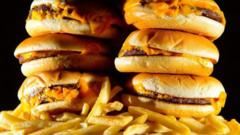Are Junk Food Ads Being Banned from Council Property?

Published: 2025-09-20 17:15:25 | Category: wales
Cardiff Council has introduced a ban on junk food advertisements on council property, aiming to promote healthier lifestyles and sustainability within the city. This initiative reflects a broader effort to tackle obesity and encourage ethical advertising practices.
Last updated: 25 October 2023 (BST)
Key Takeaways
- Junk food adverts are banned on Cardiff council property.
- Cardiff is the second Welsh local authority to implement this ban.
- Restrictions will also target petrol and diesel vehicle ads, payday loans, and tobacco products.
- From March 2026, new regulations will further limit the visibility of high-fat, salt, and sugar foods in shops.
- The policy aims to promote healthier lifestyles and ethical advertising.
Understanding Cardiff's New Advertisement Policy
The recent decision by Cardiff Council to ban junk food adverts on its property is part of a broader initiative to enhance public health and promote sustainable living. This move is significant as it sets a precedent for other local councils in Wales and beyond, aiming to reshape the way food and drink are marketed in public spaces.
What the Ban Covers
The ban specifically targets advertisements for food and drink high in fat, salt, and sugar (HFSS). This aligns with existing Welsh government policies aimed at combating the growing obesity epidemic. Additionally, Cardiff Council will restrict advertisements for petrol and diesel vehicles, payday loans, tobacco, and vaping products. Alcohol and religious advertisements will still be permitted but will be subject to strict national compliance standards.
The Impact of the Ban on Public Health
According to council officials, the aim of this policy is to improve the health and wellbeing of Cardiff's residents. By limiting the visibility of unhealthy food options, the council hopes to mitigate the impulse purchases that contribute to poor dietary choices. Dan De'Ath, the cabinet member for climate change, emphasised that while the ban restricts advertising on council property, individuals will still have the freedom to make their own purchasing decisions.
Context and Timeline of Policy Implementation
Cardiff's ban follows closely on the heels of a similar initiative by the Vale of Glamorgan, which enacted its own restrictions earlier this month. This suggests a growing momentum within Wales to address public health issues through legislative measures.
Future Regulations on Food Advertising
Looking ahead, new regulations set to take effect in March 2026 will impose additional restrictions on where HFSS foods can be displayed in shops. This includes prohibiting their placement at entrances and the ends of aisles, areas typically associated with impulse buying. Furthermore, certain promotional offers, such as buy-one-get-one-free deals for sugary drinks, will be eliminated. Shops with 50 or more employees that do not comply with these regulations could face fines.
The Role of Advertising in Consumer Choices
This policy aims to address the influence of advertising on consumer behaviour, particularly among vulnerable populations, including children. By curbing the availability and visibility of unhealthy products, the council hopes to foster an environment that encourages healthier lifestyle choices.
Ethics and Transparency in Advertising
The ban is part of a larger commitment by Cardiff Council to ensure that advertising on publicly owned assets is ethical and transparent. The council has stated that it will review the policy every three years, allowing for adaptations based on its effectiveness and the evolving landscape of public health needs.
What Happens Next?
As the council moves forward with this initiative, the focus will be on monitoring its impact on public health and consumer behaviour. The council has committed to honouring existing contracts until their expiry, ensuring a smooth transition into the new advertising landscape.
Conclusion
Cardiff Council's initiative to ban junk food adverts on council property is a significant step towards promoting healthier lifestyles and sustainable practices. As society becomes increasingly aware of the health implications of poor dietary choices, such measures could pave the way for broader changes in how food and drink are marketed in public spaces. The ongoing evaluation of this policy will be crucial in determining its success in combating obesity and fostering a healthier community.
With the growing emphasis on public health, how will other councils respond to Cardiff's bold move? What new measures might surface next in the fight against obesity? #PublicHealth #CardiffCouncil #HealthyLiving
FAQs
Why has Cardiff Council banned junk food adverts?
The ban aims to promote healthier lifestyles and combat obesity by limiting the visibility of unhealthy food options in public spaces.
What other types of adverts are restricted under this policy?
The ban also covers advertisements for petrol and diesel vehicles, payday loans, tobacco products, and vaping. Alcohol and religious ads have specific compliance requirements.
When will the new food advertising regulations take effect?
The new regulations will come into effect in March 2026, further restricting the display of high-fat, salt, and sugar foods in shops.
How will the ban impact consumer choices?
By reducing exposure to unhealthy food advertisements, the council hopes to encourage healthier purchasing decisions among consumers.
Will existing advertising contracts be affected by the ban?
No, existing contracts will be honoured until their expiry, allowing for a phased implementation of the new policy.



